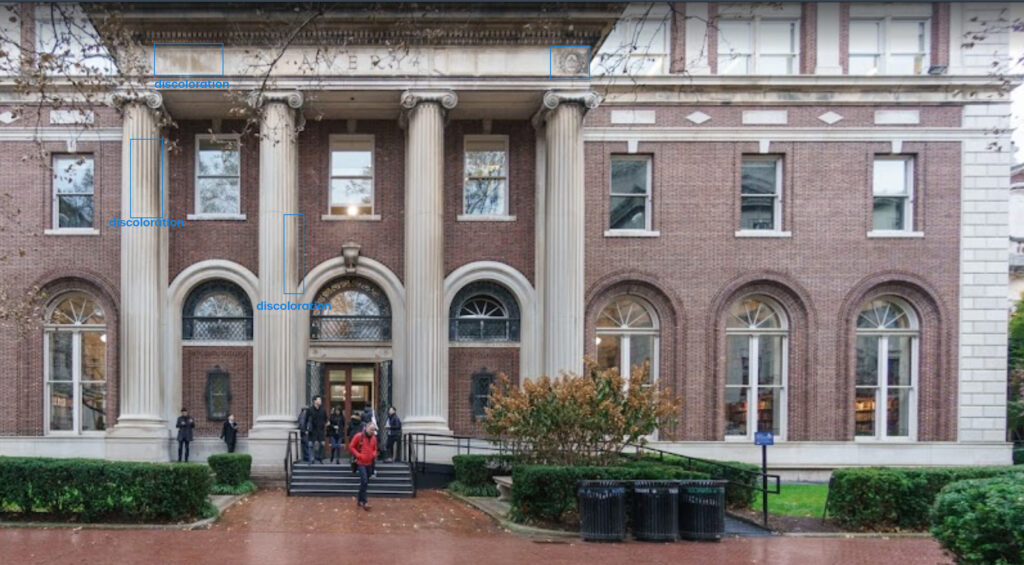
Description:
Required Skills: Programlama, Fotograf düzenleme -- Programming (Phython Basics - a refresher will be included in the workshop), Image Editing (simple functions),
Required Software: Python
Required Hardware: Laptop, Desktop or Cloud Computing
Maximum number of participating students: 100
Mimari miras, toplumların kültür birikimi için vazgeçilmezdir. Yapılı çevre, kültürel kimliği tanımlar ve tarihi olayların bir hatırlatıcısı olarak hizmet eder. Bu nedenle yapılı çevrenin korunması kritik öneme sahiptir ve multidisipliner yaklaşımlar gerektirir. Başarılı bir koruma yaklaşımı için, gerekli onarımları ve eylem planını ve cephedeki bozulmayı belirlemek çok önemlidir. Bu çalışmada, binaların cephelerindeki bozulmayı algılayacak bir Makina Öğrenmesi(MÖ) modeli geliştirilecektir. Model binalardaki malzeme kaybı, deformasyon, renk bozulması, kirlilik gibi bozulma olan kısımlarını tanımlayabilir. Aynı zamanda bu bozulmanın olmadan önceki durumu imajlarda tekrar yaratılabilir.
Bu çalıştayda, mimari miras ve yapılı çevrenin korunması konularında MÖ uygulanacaktır. Katılımcılar, öncelikle Python programlama dilinde MÖ uygulamalarında gerekli olacak minimum yeterliğe geleceklerdir. Ayrıca, MÖ uygulamalarında gerekli veriseti toplama, etiketleme konuları tartışılacaktır. Devamında katılımcılara MÖ algoritmaları ve toplanan verisetlerinin bu algoritmalarda nasıl kullanacakları öğretilecektir. Çalıştayın sonunda katılımcılar toplanan verisetleri ve tartışılan modelleri kullanarak kendi seçtikleri bir bozulma türünü odaklanarak bir model geliştireceklerdir. Bu çalıştayın amacı katılımcılara bir MÖ modelini başlangıçtan sonuna kadar geliştirme yetisi kazandırmaktır.
ENG
Architectural heritage is essential for the cultural life. The built environment
defines the cultural identity and serves as a reminder of historical events. Therefore, protecting the
built environment is critical and requires multidisciplinary approaches in preservation. For a
successful preservation approach, identifying the degradation of the façade is critical to determine
necessary repairs and course of action. This workshop aims to build a digital tool to recognize decay
in façade of buildings. It can identify parts of buildings with type of decay, such as loss of material,
deformation, discoloration etc. Also the model can create an image that can demonstrate the state of the facade before the deterioration.
In this workshop, ML will be applied to the protection of architectural heritage and the built environment. Participants will obtain/refresh the minimum proficiency required to practice ML in the Python programming language. In addition, necessary dataset collection and labelling techniques in ML applications will be discussed. Afterwards, participants will be taught about ML algorithms and how to use the collected datasets in these algorithms. At the end of the workshop, participants will develop a model using collected datasets and the models discussed, focusing on a type of deterioration of their choice. The aim of this workshop is to equip participants with the ability to develop an ML model from start to finish.

Schedule:
timezone: (GMT +3:00) Baghdad, Riyadh, Moscow, St. Petersburg| Start time | End time | Description |
|---|---|---|
| 2022-06-27 - 10:00 | 2022-06-27 - 13:00 | Python Tekrarı - Fotograf toplama ödevi - Refresher on Python - Assignment to collect images |
| 2022-06-28 - 10:00 | 2022-06-28 - 13:00 | MÖye giriş - Fotoların etiketlenmesi - Introduction to ML, tools, algorithms - Assignment labelling of the photos |
| 2022-06-29 - 10:00 | 2022-06-29 - 13:00 | MÖye devam - Cont. Int. to ML |
| 2022-06-30 - 10:00 | 2022-06-30 - 13:00 | Proje - End Project |
| 2022-07-01 - 10:00 | 2022-07-01 - 13:00 | Proje ve Sunumlar - End Project - Presentations |
Instructors:
 |
Özgün Balaban | Özgün Balaban is an Adjunct Assistant Professor at Columbia GSAPP. He is a computational design researcher and an electrical engineer. He received his Ph.D. from the Architecture and Sustainable Design Pillar at Singapore University of Technology and Design (SUTD) in 2019, with the dissertation titled “Understanding Urban Leisure Walking Behaviour: Correlations Between Neighbourhood Features and Fitness Tracking Data”. His research interests are data-informed design and urban planning, machine learning in design, the use of game environments for design research, digital heritage, building information modelling, and geographic information system. |
Disclaimer:
All workshops will accept 100 applications MAX.
